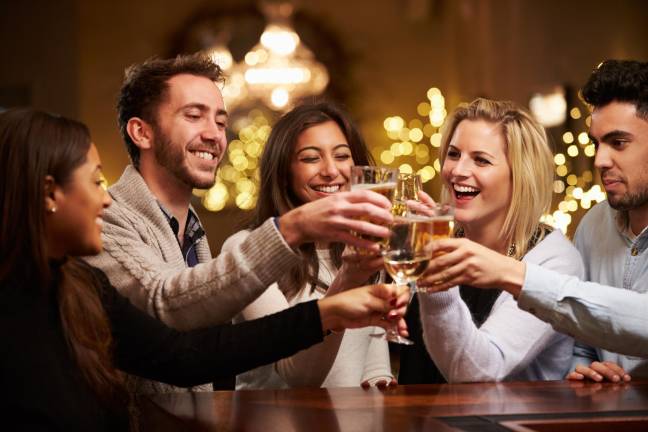Restaurant liquor licenses ought to go to actual restaurants, not convenience stores

(AP) The cost of liquor licenses in Pennsylvania has risen dramatically as a result of a package of changes made three years ago to the Prohibition-era Pennsylvania Liquor Code. As staff writer Chad Umble wrote in last week's Sunday LNP, “The changes opened up beer and wine sales to a new class of corporate buyers — convenience and grocery store chains." Because “a fixed supply of liquor licenses is available for each county — and new buyers with deep pockets began pursuing them — basic economics explains why prices more than doubled."
We cheered the passage in 2016 of Act 39, which permitted, at long last, the sale of wine in grocery stores.
Having enjoyed the ease of being able to pick up a bottle of wine while shopping for the ingredients for dinner in other states, we were pleased to see Pennsylvania take a baby step out of the Prohibition era.
But as we wrote then, and still believe, “Now, the governor and the Legislature need to do what should have been done when Franklin D. Roosevelt still occupied the White House — get Pennsylvania out of the liquor business, finally, once and forever."
The liquor laws in the commonwealth remain arcane and complex, including those related to the licensing of businesses for the sale of beer, wine and liquor.
As Patrick Gleason, of Americans for Tax Reform, asserted in a 2017 column on forbes.com, “When it comes to misguided restrictions on the sale of alcohol, no state holds a candle to Pennsylvania and its ludicrous alcohol regulatory regime."
He noted: “Aside from Utah, Pennsylvania is the only state where the government has total control of wine and spirits retail and wholesale operations."
This remains true even after the package of liquor law changes went into effect in 2016 — changes, Umble wrote, that “followed years of efforts to privatize liquor sales in Pennsylvania. While the updates that were rolled into Act 39 stopped short of privatization, they represented the biggest update since the 1930s."
“Among many other things," Umble explained, “Act 39 expanded hours at state-run Fine Wine and Good Spirits stores and allowed them to start selling lottery tickets, while holders of restaurant liquor licenses could sell wine for takeout."
Melissa Bova, vice president of government affairs for the Pennsylvania Restaurant Association, told Umble, “It was just kind of `throw a bunch of stuff in the bill, and see who passes it.' We were all trying to figure out what was in it at the end of the day."
Throwing a bunch of stuff into a bill and see who passes it — that's a perfect encapsulation of the way our state Legislature often works. Legislation created in a slapdash way almost always leads to unintended consequences — and certainly did in this instance.
Act 39 clarified that convenience stores that sold gas could sell beer if they did it from a separate area. This “tweak," Umble noted, “continues to have repercussions for restaurateurs in Lancaster County."
Particularly for small, independent restaurateurs without the resources of a large corporate chain.
As Aaron Zeamer, an attorney with Russell, Krafft and Gruber who specializes in liquor license transactions, told Umble, “A chef who has been toiling in the industry for a long time and wants to go out on his own, it's really, really difficult for them to do that and have a successful model."
See? Unintended consequence.
It's a routine function of state government to control the sale of liquor licenses. Pennsylvania, however, limits the number of liquor licenses available in each county (and prohibits their transfer between counties).
Lancaster County has 362 liquor licenses; 228 of them are restaurant licenses.
The state isn't creating new restaurant liquor licenses, so, aside from the infrequent auction of expired licenses, the only means of getting a liquor license is to purchase an existing one held by another business.
And supermarket and convenience store chains are driving up the costs of licenses on the private market, making it difficult for would-be restaurateurs to launch new businesses. A new venture's other options: to sell Pennsylvania-produced beer, liquor or wine in concert with a Pennsylvania brewery or distillery, or to allow customers to bring their own alcohol. Either option signifies tighter profit margins for a startup with challenges enough on its plate.
We find it difficult to understand why coveted restaurant licenses are going to convenience stores. Those stores merely need to install a dining area that seats at least 30 and offer food that's prepared on site, and voila, they're apparently considered restaurants, in the eyes of the PLCB. But let's be honest: The dining area is mostly a prop, a check in the box on the list of the PLCB's requirements.
And why offer ready access to alcohol at convenience stores, which are designed mostly for quick visits by people in cars (that's why they're called convenience stores)? It's hard to imagine a supermarket shopper opening a bottle of wine between forays into the dairy and cereal aisles. But state law allows a customer — again who's likely en route somewhere in a car — to imbibe a beer at a convenience store with a restaurant license. Which, to put it mildly, doesn't strike us as wise.
Moreover, why would a supposedly pro-small business commonwealth put owners of small, local, independent restaurants — actual restaurants — at such a distinct disadvantage?
Pennsylvania's liquor licensing system is bizarre. And it ought to be overhauled.
LNP